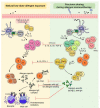Deciphering Differential Behavior of Immune Responses as the Foundation for Precision Dosing in Allergen Immunotherapy
- PMID: 36836557
- PMCID: PMC9964800
- DOI: 10.3390/jpm13020324
Deciphering Differential Behavior of Immune Responses as the Foundation for Precision Dosing in Allergen Immunotherapy
Abstract
Like in many fields of medicine, the concept of precision dosing has re-emerged in routine practice in allergology. Only one retrospective study on French physicians' practice has addressed this topic so far and generated preliminary data supporting dose adaptation, mainly based on experience, patient profile understanding and response to treatment. Both intrinsic and extrinsic factors shape the individual immune system response to allergen immunotherapy (AIT). Herein, we focus on key immune cells (i.e., dendritic cells, innate lymphoid cells, B and T cells, basophils and mast cells) involved in allergic disease and its resolution to further understand the effect of AIT on the phenotype, frequency or polarization of these cells. We strive to discriminate differences in immune responses between responders and non-responders to AIT, and discuss the eligibility of a non/low-responder subset for dose adaptation. A differential behavior in immune cells is clearly observed in responders, highlighting the importance of conducting clinical trials with large cohorts of well-characterized subjects to decipher the immune mechanism of AIT. We conclude that there is a need for designing new clinical and mechanistic studies to support the scientific rationale of dose adaptation in the interest of patients who do not properly respond to AIT.
Keywords: T cells; allergen immunotherapy; basophils; biomarkers; clinical response; determinants; dose adaptation; immune response; innate lymphoid cells; precision dosing.
Conflict of interest statement
A.M. has received personal fees and non-financial support from Astra Zeneca, Chiesi, GSK, Menarini, Novartis, Sanofi, and Stallergenes-Greer. D.C. reports consulting services for ALK-Abelló and Stallergenes-Greer, and has received speaker honoraria from these companies. L.C. reports ad hoc consulting services for ALK-Abelló and Stallergenes-Greer. M.H.S has received research grants from Allergy Therapeutics, Angany Inc, Immune Tolerance Network, Laboratorios LETI, Medical Research Council, Revolo Biotherapeutics, Stallergenes-Greer, consulting fees from Bristol Myers Squibb and lecture fees from Allergy Therapeutics and Laboratorios LETI. S.S. and L.M. are employees of Stallergenes-Greer. J.F.N, M.V. and T.H. have no conflict of interest to declare.
Figures

Similar articles
-
Decreased CRTH2 Expression and Response to Allergen Re-stimulation on Innate Lymphoid Cells in Patients With Allergen-Specific Immunotherapy.Allergy Asthma Immunol Res. 2018 Nov;10(6):662-674. doi: 10.4168/aair.2018.10.6.662. Allergy Asthma Immunol Res. 2018. PMID: 30306748 Free PMC article.
-
Mechanisms in AIT: Insights 2021.Allergol Select. 2022 Nov 21;6:259-266. doi: 10.5414/ALX02300E. eCollection 2022. Allergol Select. 2022. PMID: 36457721 Free PMC article. Review.
-
Mechanisms of allergen-specific immunotherapy: multiple suppressor factors at work in immune tolerance to allergens.J Allergy Clin Immunol. 2014 Mar;133(3):621-31. doi: 10.1016/j.jaci.2013.12.1088. J Allergy Clin Immunol. 2014. PMID: 24581429 Review.
-
Diverse immune mechanisms of allergen immunotherapy for allergic rhinitis with and without asthma.J Allergy Clin Immunol. 2022 Mar;149(3):791-801. doi: 10.1016/j.jaci.2022.01.016. Epub 2022 Jan 29. J Allergy Clin Immunol. 2022. PMID: 35093483 Review.
-
Mechanisms of allergen-specific immunotherapy and allergen tolerance.Allergol Int. 2020 Oct;69(4):549-560. doi: 10.1016/j.alit.2020.08.002. Epub 2020 Sep 6. Allergol Int. 2020. PMID: 32900655 Review.
References
-
- Darwich A.S., Polasek T.M., Aronson J.K., Ogungbenro K., Wright D.F., Achour B., Reny J.-L., Daali Y., Eiermann B., Cook J., et al. Model-Informed Precision Dosing: Background, Requirements, Validation, Implementation, and Forward Trajectory of Individualizing Drug Therapy. Annu. Rev. Pharmacol. Toxicol. 2021;61:225–245. doi: 10.1146/annurev-pharmtox-033020-113257. - DOI - PubMed
Publication types
Grants and funding
LinkOut - more resources
Full Text Sources

